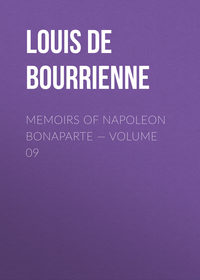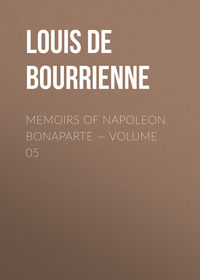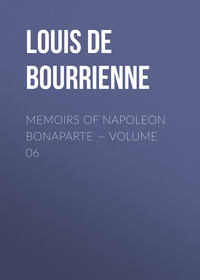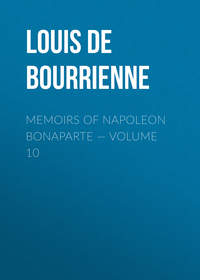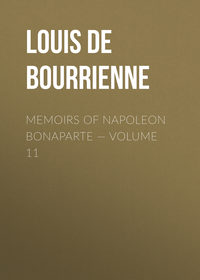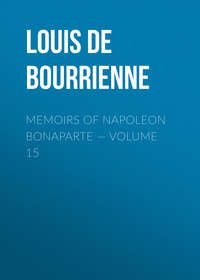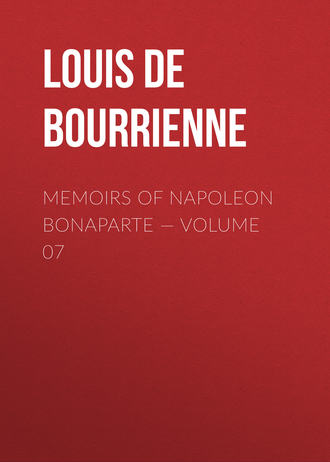 полная версия
полная версияMemoirs of Napoleon Bonaparte — Volume 07
Bonaparte's general dislike of literary men was less the result of prejudice than circumstances. In order to appreciate or even to read literary works time is requsite, and time was so precious to him that he would have wished, as one may say, to shorten a straight line. He liked only those writers who directed their attention to positive and precise things, which excluded all thoughts of government and censures on administration. He looked with a jealous eye on political economists and lawyers; in short, as all persons who in any way whatever meddled with legislation and moral improvements. His hatred of discussions on those subjects was strongly displayed on the occasion of the classification of the Institute. Whilst he permitted the reassembling of a literary class, to the number of forty, as formerly, he suppressed the class of moral and political science. Such was his predilection for things of immediate and certain utility that even in the sciences he favoured only such as applied to terrestrial objects. He never treated Lalande with so much distinction as Monge and Lagrange. Astronomical discoveries could not add directly to his own greatness; and, besides, he could never forgive Lalande for having wished to include him in a dictionary of atheists precisely at the moment when he was opening negotiations with the court of Rome.
Bonaparte wished to be the sole centre of a world which he believed he was called to govern. With this view he never relaxed in his constant endeavour to concentrate the whole powers of the State in the hands of its Chief. His conduct upon the subject of the revival of public instruction affords evidence of this fact. He wished to establish 6000 bursaries, to be paid by Government, and to be exclusively at his disposal, so that thus possessing the monopoly of education, he could have parcelled it out only to the children of those who were blindly devoted to him. This was what the First Consul called the revival of public instruction. During the period of my closest intimacy with him he often spoke to me on this subject, and listened patiently to my observations. I remember that one of his chief arguments was this: "What is it that distinguishes men? Education—is it not? Well, if the children of nobles be admitted into the academies, they will be as well educated as the children of the revolution, who compose the strength of my government. Ultimately they will enter into my regiments as officers, and will naturally come in competition with those whom they regard as the plunderers of their families. I do not wish that!"
My recollections have caused me to wander from the journey of the First Consul and Madame Bonaparte to the seabord departments and Belgium. I have, however, little to add to what I have already stated on the subject. I merely remember that Bonaparte's military suite, and Lauriston and Rapp in particular, when speaking to me about the journey, could not conceal some marks of discontent on account of the great respect which Bonaparte had shown the clergy, and particularly to M. de Roquelaure, the Archbishop of Malines (or Mechlin). That prelate, who was a shrewd man, and had the reputation of having been in his youth more addicted to the habits of the world than to those of the cloister, had become an ecclesiastical courtier. He went to Antwerp to pay his homage to the First Consul, upon whom he heaped the most extravagant praises. Afterwards, addressing Madame Bonaparte, he told her that she was united to the First Consul by the sacred bonds of a holy alliance. In this harangue, in which unction was singularly blended with gallantry, surely it was a departure from ecclesiastical propriety to speak of sacred bonds and holy alliance when every one knew that those bonds and that alliance existed only by a civil contract. Perhaps M. de Roquelaure merely had recourse to what casuists call a pious fraud in order to engage the married couple to do that which he congratulated them on having already done. Be this as it may, it is certain that this honeyed language gained M. de Roquelaure the Consul's favour, and in a short time after he was appointed to the second class of the Institute.
CHAPTER XXI
1804.
The Temple—The intrigues of Europe—Prelude to the Continental system—Bombardment of Granville—My conversation with the First Consul on the projected invasion of England—Fauche Borel—Moreau and Pichegru—Fouche's manoeuvres—The Abbe David and Lajolais— Fouche's visit to St. Cloud—Regnier outwitted by Fouche— My interview with the First Consul—His indignation at the reports respecting Hortense—Contradiction of these calumnies—The brothers Faucher—Their execution—The First Consul's levee—My conversation with Duroc—Conspiracy of Georges, Moreau, and Pichegru—Moreau averse to the restoration of the Bourbons—Bouvet de Lozier's attempted suicide—Arrest of Moreau—Declaration of MM. de Polignac and de Riviere—Connivance of the police—Arrest of M. Carbonnet and his nephew.
The time was passed when Bonaparte, just raised to the Consulate, only proceeded to the Temple to release the victims of the "Loi des suspects" by his sole and immediate authority. This state prison was now to be filled by the orders of his police. All the intrigues of Europe were in motion. Emissaries came daily from England, who, if they could not penetrate into the interior of France, remained in the towns near the frontiers, where they established correspondence, and published pamphlets, which they sent to Paris by post, in the form of letters.
The First Consul, on the other hand, gave way, without reserve, to the natural irritation which that power had excited by her declaration of war. He knew that the most effective war he could carry on against England would be a war against her trade.
As a prelude to that piece of madness, known by the name of the Continental system, the First Consul adopted every possible preventive measure against the introduction of English merchandise. Bonaparte's irritation against the English was not without a cause. The intelligence which reached Paris from the north of France was not very consolatory. The English fleets not only blockaded the French ports, but were acting on the offensive, and had bombarded Granville. The mayor of the town did his duty, but his colleagues, more prudent, acted differently. In the height of his displeasure Bonaparte issued a decree, by which he bestowed a scarf of honour on Letourneur, the mayor, and dismissed his colleagues from office as cowards unworthy of trust. The terms of this decree were rather severe, but they were certainly justified by the conduct of those who had abandoned their posts at s critical moment.
I come now to the subject of the invasion of England, and what the First Consul said to me respecting it. I have stated that Bonaparte never had any idea of realising the pretended project of a descent on England. The truth of this assertion will appear from a conversation which I had with him after he returned from his journey to the north. In this conversation he repeated what he had often before mentioned to me in reference to the projects and possible steps to which fortune might compel him to resort.
The peace of Amiens had been broken about seven months when, on the 15th of December 1803, the First Consul sent for me to the Tuileries. His incomprehensible behaviour to me was fresh in my mind; and as it was upwards of a year since I had seen him, I confess I did not feel quite at ease when I received the summons. He was perfectly aware that I possessed documents and data for writing his history which would describe facts correctly, and destroy the illusions with which his flatterers constantly, entertained the public. I have already stated that at that period I had no intention of the kind; but those who laboured constantly to incense him against me might have suggested apprehensions on the subject. At all events the fact is, that when he sent for me I took the precaution of providing myself with a night-cap, conceiving it to be very likely that I should be sent to sleep at Vincennes. On the day appointed for the interview Rapp was on duty. I did not conceal from him my opinion as to the possible result of my visit. "You need not be afraid," said Rapp; "the First Consul merely wishes to talk with you." He then announced me.
Bonaparte came into the grand salon where I awaited him, and addressing me in the most good-humoured way said, "What do the gossips say of my preparations for the invasion of England?"—"There is a great difference of opinion on the subject, General," I replied. "Everyone speaks according to his own views. Suchet, for instance, who comes to see me very often, has no doubt that it will take place, and hopes to give you on the occasion fresh proofs of his gratitude and fidelity."—"But Suchet tells me that you do not believe it will be attempted."—"That is true, I certainly do not."—"Why?"—"Because you told me at Antwerp, five years ago, that you would not risk France on the cast of a die—that the adventure was too hazardous—and circumstances have not altered since that time."—"You are right. Those who look forward to the invasion of England are blockheads. They do not see the affair in its true light. I can, doubtless, land in England with 100,000 men. A great battle will be fought, which I shall gain; but I must reckon upon 30,000 men killed, wounded, and prisoners. If I march on London, a second battle must be fought. I will suppose myself again victorious; but what should I do in London with an army diminished three-fourths and without the hope of reinforcements? It would be madness. Until our navy acquires superiority it is useless to think of such a project. The great assemblage of troops in the north has another object. My Government must be the first in the world, or it must fall." Bonaparte then evidently wished it to be supposed that he entertained the design of invading England in order to divert the attention of Europe to that direction.
From Dunkirk the First Consul proceeded to Antwerp, where also he had assembled experienced men to ascertain their opinions respecting the surest way of attempting a landing, the project of which was merely a pretence. The employment of large ships of was, after rang discussions, abandoned in favour of a flotilla.
—[At this period a caricature (by Gillray) appeared in London. which was sent to Paris, and strictly sought after by the police. One of the copies was shown to the First Consul, who was highly indignant at it. The French fleet was represented by a number of nut-shells. An English sailor, seated on a rock, was quietly smoking his pipe, the whiffs of which were throwing the whole squadron into disorder.—Bourrienne. Gillray's caricatures should be at the reader's side during the perusal of this work, also English Caricature and Satire on Napoleon I., by J. Ashton Chatto: and Windus, 1884.]—
After visiting Belgium, and giving directions there, the First Consul returned from Brussels to Paris by way of Maestricht, Liege, and Soissons.
Before my visit to the Tuileries, and even before the rupture of the peace of Amiens, certain intriguing speculators, whose extravagant zeal was not less fatal to the cause of the Bourbons than was the blind subserviency of his unprincipled adherents to the First Consul, had taken part in some underhand manoeuvres which could have no favourable result. Amongst these great contrivers of petty machinations the well-known Fauche Borel, the bookseller of Neufchatel, had long been conspicuous. Fauche Borel, whose object was to create a stir, and who wished nothing better than to be noticed and paid, failed not to come to France as soon as the peace of Amiens afforded him the opportunity. I was at that time still with Bonaparte, who was aware of all these little plots, but who felt no personal anxiety on the subject, leaving to his police the care of watching their authors.
The object of Fauche Borel's mission was to bring about a reconciliation between Moreau and Pichegru. The latter general, who was banished on the 18th Fructidor 4th (September 1797), had not obtained the First Consul's permission to return to France. He lived in England, where he awaited a favourable opportunity for putting his old projects into execution. Moreau was in Pains, but no longer appeared at the levees or parties of the First Consul, and the enmity of both generals against Bonaparte, openly avowed on the part of Pichegru; and still disguised by Moreau, was a secret to nobody. But as everything was prosperous with Bonaparte he evinced contempt rather than fear of the two generals. His apprehensions were, indeed, tolerably allayed by the absence of the one and the character of the other. Moreau's name had greater weight with the army than that of Pichegru; and those who were plotting the overthrow of the Consular Government knew that that measure could not be attempted with any chance of success without the assistance of Moreau. The moment was inopportune; but, being initiated in some secrets of the British Cabinet, they knew that the peace was but a truce, and they determined to profit by that truce to effect a reconciliation which might afterwards secure a community of interests. Moreau and Pichegru had not been friends since Moreau sent to the Directory the papers seized in M. de Klinglin's carriage, which placed Pichegru's treason in so clear a light. Since that period Pichegru's name possessed no influence over the minds of the soldiers, amongst whom he had very few partisans, whilst the name of Moreau was dear to all who had conquered under his command.
Fauche Borel's design was to compromise Moreau without bringing him to any decisive step. Moreau's natural indolence, and perhaps it may be said his good sense, induced him to adopt the maxim that it was necessary to let men and things take their course; for temporizing policy is often as useful in politics as in war. Besides, Moreau was a sincere Republican; and if his habit of indecision had permitted him to adopt any resolution, it is quite certain that he would not then have assisted in the reestablishment of the Bourbons, as Pichegru wished.
What I have stated is an indispensable introduction to the knowledge of plots of more importance which preceded the great event that marked the close of the Consulship: I allude to the conspiracy of Georges, Cadoudal, Moreau, and Pichegru, and that indelible stain on the character of Napoleon,—the death of the Duc d'Enghien. Different opinions have been expressed concerning Georges' conspiracy. I shall not contradict any of them. I will relate what I learned and what I saw, in order to throw some light on that horrible affair. I am far from believing what I have read in many works, that it was planned by the police in order to pave the First Consul's way to the throne. I think that it was contrived by those who were really interested in it, and encouraged by Fouche in order to prepare his return to office.
To corroborate my opinion respecting Fouche's conduct and his manoeuvres I must remind the reader that about the close of 1803 some persons conceived the project of reconciling Moreau and Pichegru. Fouche, who was then out of the Ministry, caused Moreau to be visited by men of his own party, and who were induced, perhaps unconsciously, by Fouche's art, to influence and irritate the general's mind. It was at first intended that the Abbe David, the mutual friend of Moreau and Pichegru, should undertake to effect their reconciliation; but he, being arrested and confined in the Temple, was succeeded by a man named Lajolais, whom every circumstance proves to have been employed by Fouche. He proceeded to London, and, having prevailed on Pichegru and his friends to return to France, he set off to announce their arrival and arrange everything for their reception and destruction. Moreau's discontent was the sole foundation of this intrigue. I remember that one day, about the end of January 1804, I called on Fouche, who informed me that he had been at St. Cloud, where he had had a long conversation with the First Consul on the situation of affairs. Bonaparte told him that he was satisfied with the existing police, and hinted that it was only to make himself of consequence that he had given a false colouring to the picture. Fouche asked him what he would say if he told him that Georges and Pichegru had been for some time in Paris carrying on the conspiracy of which he had received information. The First Consul, apparently delighted at what he conceived to be Fouche's mistake, said, with an air of contempt, "You are well informed, truly! Regnier has just received a letter from London stating that Pichegru dined three days ago at Kingston with one of the King of England's ministers."
As Fouche, however, persisted in his assertion, the First Consul sent to Paris for the Grand Judge, Regnier, who showed Fouche the letter he had received. The First Consul triumphed at first to see Fouche at fault; but the latter so clearly proved that Georges and Pichegru were actually in Paris that Regnier began to fear he had been misled by his agents, whom his rival paid better than he did. The First Consul, convinced that his old minister knew more than his new one, dismissed Regnier, and remained a long time in consultation with Fouche, who on that occasion said nothing about his reinstatement for fear of exciting suspicion. He only requested that the management of the business might be entrusted to Real, with orders to obey whatever instructions he might receive from him. I will return hereafter to the arrest of Moreau and the other persons accused, and will now subjoin the account of a long interview which I had with Bonaparte in the midst of these important events.
On the 8th of March 1804, some time after the arrest but before the trial of General Moreau, I had an audience of the First Consul, which was unsought on my part. Bonaparte, after putting several unimportant questions to me as to what I was doing, what I expected he should do for me, and assuring me that he would bear me in mind, gave a sudden turn to the conversation, and said, "By the by, the report of my connection with Hortense is still kept up: the most abominable rumours have been spread as to her first child. I thought at the time that these reports had only been admitted by the public in consequence of the great desire that I should not be childless. Since you and I separated have you heard them repeated?"—"Yes, General, oftentimes; and I confess I could not have believed that this calumny would have existed so long."—"It is truly frightful to think of! You know the truth—you have seen all—heard all —nothing could have passed without your knowledge; you were in her full confidence during the time of her attachment to Duroc. I therefore expect, if you should ever write anything about me, that you will clear me from this infamous imputation. I would not have it accompany my name to posterity. I trust in you. You have never given credit to the horrid accusation?"—"No, General, never." Napoleon then entered into a number of details on the previous life of Hortense; on the way in which she conducted herself, and on the turn which her marriage had taken. "It has not turned out," he said, "as I wished: the union has not been a happy one. I am sorry for it, not only because both are dear to me, but because the circumstance countenances the infamous reports that are current among the idle as to my intimacy with her." He concluded the conversation with these words:—"Bourrienne, I sometimes think of recalling you; but as there is no good pretext for so doing, the world would say that I have need of you, and I wish it to be known that I stand in need of nobody." He again said a few words about Hortense. I answered that it would fully coincide with my conviction of the truth to do what he desired, and that I would do it; but that suppressing the false reports did not depend on me.
Hortense, in fact, while she was Mademoiselle BEAUHARNAIS, regarded Napoleon with respectful awe. She trembled when she spoke to him, and never dared to ask him a favour. When she had anything to solicit she applied to me; and if I experienced any difficulty in obtaining for her what she sought, I mentioned her as the person for whom I pleaded. "The little simpleton!" Napoleon would say, "why does she not ask me herself: is the girl afraid of me?" Napoleon never cherished for her any feeling but paternal tenderness. He loved her after his marriage with her mother as he would have loved his own child. During three years I was a witness to all their most private actions, and I declare that I never saw or heard anything that could furnish the least ground for suspicion, or that afforded the slightest trace of the existence of a culpable intimacy. This calumny must be classed among those with which malice delights to blacken the characters of men more brilliant than their fellows, and which are so readily adopted by the light-minded and unreflecting. I freely declare that did I entertain the smallest doubt with regard to this odious charge, of the existence of which I was well aware before Napoleon spoke to me on the subject, I would candidly avow it. He is no more: and let his memory be accompanied only by that, be it good or bad, which really belongs to it. Let not this reproach be one of those charged against him by the impartial historian. I must say, in concluding this delicate subject, that the principles of Napoleon on points of this kind were rigid in the utmost degree, and that a connection of the nature of that charged against him was neither in accordance with his morals nor his tastes.
I cannot tell whether what followed was a portion of his premeditated conversation with me, or whether it was the result of the satisfaction he had derived from ascertaining my perfect conviction of the purity of his conduct with regard to Hortense, and being assured that I would express that conviction. Be this as it may, as I was going out at the door he called me back, saying, "Oh! I have forgotten something." I returned. "Bourrienne," said he, "do you still keep up your acquaintance with the Fauchers?"—"Yes, General; I see them frequently."—"You are wrong."— "Why should I not? They are clever, well-educated men, and exceedingly pleasant company, especially Caesar. I derive great pleasure from their society; and then they are almost the only persons whose friendship has continued faithful to me since I left you. You know people do not care for those who can render them no service."—"Maret will not see the Fauchers."—"That may be, General; but it is nothing to me; and you must recollect that as it was through him I was introduced to them at the Tuileries, I think he ought to inform me of his reasons for dropping their acquaintance."—"I tell you again he has closed his door against them. Do you the same; I advise you." As I did not seem disposed to follow this advice without some plausible reason, the First Consul added, "You must know, then, that I learn from Caesar all that passes in your house. You do not speak very ill of me yourself, nor does any one venture to do so in your presence. You play your rubber and go to bed. But no sooner are you gone than your wife, who never liked me, and most of those who visit at your house, indulge in the most violent attacks upon me. I receive a bulletin from Caesar Faucher every day when he visits at your house; this is the way in which he requites you for your kindness, and for the asylum you afforded his brother.—[Constantine Rancher had been condemned in contumacy for the forgery of a public document.—Bourrienne.]—But enough; you see I know all—farewell;" and he left me.
The grave having closed over these two brothers,—[The Fauchers were twin brothers, distinguished in the war of the Revolution, and made brigadier- generals at the same time on the field of battle. After the Cent Jours they refused to recognise the Bourbons, and were shot by sentence of court-martial at Bordeaux. (Bouillet)]—I shall merely state that they wrote me a letter the evening preceding their execution, in which they begged me to forgive their conduct towards me. The following is an extract from this letter:
In our dungeon we hear our sentence of death being cried in the streets. To-morrow we shall walk to the scaffold; but we will meet death with such calmness and courage as shall make our executioners blush. We are sixty years old, therefore our lives will only be shortened by a brief apace. During our lives we have shared in common, illness, grief, pleasure, danger, and good fortune. We both entered the world on the same day, and on the same day we shall both depart from it. As to you, sir….


